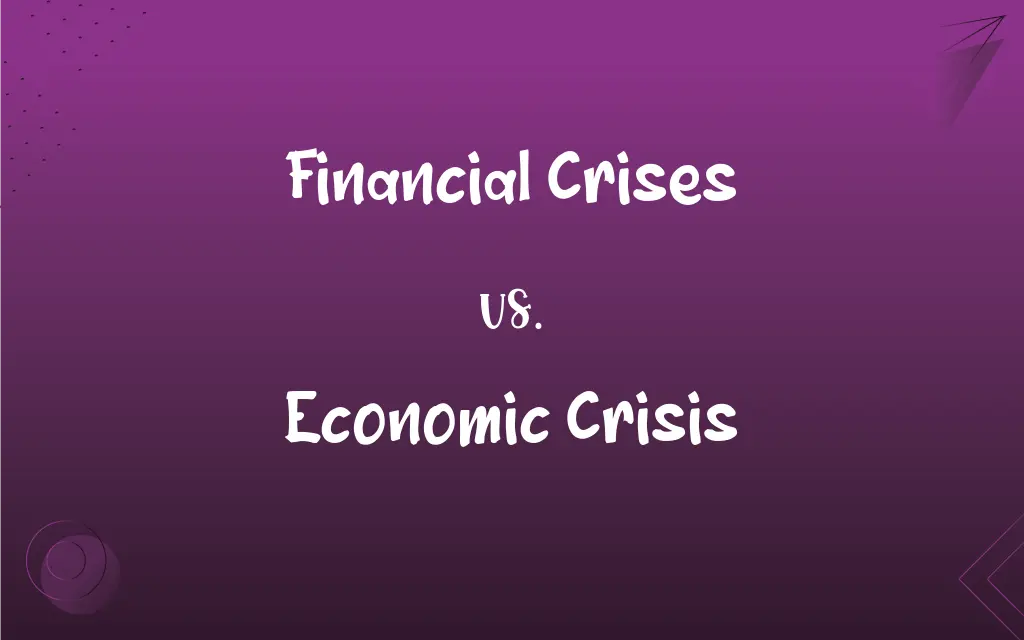Financial Crises vs. Economic Crisis: What's the Difference?
Edited by Aimie Carlson || By Harlon Moss || Updated on October 27, 2023
Financial crises relate to disruptions in financial markets or institutions, while economic crisis denotes broader economic downturns or disruptions.

Key Differences
Financial crises are specific disturbances or disruptions within the financial system, often affecting banks, lending institutions, and stock markets. An economic crisis, on the other hand, is a wider disturbance in the overall economy, impacting sectors beyond just the financial realm.
While financial crises may be triggered by events like bank runs, credit freezes, or stock market crashes, an economic crisis could result from various causes, including inflation spikes, mass unemployment, or supply chain disruptions. It's worth noting that financial crises can often lead to or exacerbate an economic crisis.
Financial crises are primarily concerned with the inability of institutions to meet their financial obligations, leading to a lack of confidence within the financial system. An economic crisis, meanwhile, signifies a general downturn in economic activity, affecting production, employment, and spending.
A country might experience financial crises without a full-blown economic crisis if interventions are swift and effective. Conversely, an economic crisis can be triggered by factors other than financial crises, like natural disasters or geopolitical events, which might have nothing to do with the health of the financial system.
Financial crises can be a symptom or precursor to an economic crisis. For instance, the subprime mortgage crisis was a financial crisis that played a significant role in triggering the 2008 global economic crisis.
ADVERTISEMENT
Comparison Chart
Definition
Disruptions in financial institutions
Broad downturns in the economy
Primary Causes
Bank runs, credit freezes, market crashes
Inflation, unemployment, production drops
Scope
Primarily financial sector
Entire economy
Impact
Confidence in financial system
Overall economic activity and well-being
Can Lead to
Economic crisis if not managed
Broader socio-economic issues and challenges
ADVERTISEMENT
Financial Crises and Economic Crisis Definitions
Financial Crises
Situations where financial institutions lose their ability to function, often due to insolvency.
During financial crises, governments often intervene to stabilize the system.
Economic Crisis
A period marked by high unemployment, falling income, and reduced production.
Many nations faced an economic crisis in the wake of the COVID-19 pandemic.
Financial Crises
Disruptions in the normal functioning of financial markets or institutions.
The Great Depression was preceded by significant financial crises.
Economic Crisis
Situations where economic indicators reflect major downturns or disruptions.
The oil shocks of the 1970s led to an economic crisis in many countries.
Financial Crises
Events leading to sharp declines in asset prices or the failure of major financial institutions.
The collapse of Lehman Brothers marked one of the major events in recent financial crises.
Economic Crisis
A significant decline in economic activity across the economy.
The 2008 recession was an economic crisis that affected millions globally.
Financial Crises
Periods marked by a sudden lack of confidence in the financial system.
The stock market crash of 1929 is an example of events that can trigger financial crises.
Economic Crisis
Broad economic downturns often accompanied by inflation or deflation.
Stagflation in the 1970s was a unique type of economic crisis combining stagnation and inflation.
Financial Crises
Events where liquidity evaporates, causing freezes in lending and borrowing.
In some financial crises, central banks act as lenders of last resort to restore liquidity.
Economic Crisis
Prolonged periods where an economy operates below its potential output.
The aftermath of the Great Depression saw a severe economic crisis lasting for years.
FAQs
What are financial crises?
Financial crises are disruptions within the financial system, often affecting banks, stock markets, and lending institutions.
Are financial crises always a symptom of economic crises?
Not always; financial crises can occur without leading to a broader economic crisis if interventions are effective.
What defines an economic crisis?
An economic crisis denotes a broader downturn or disturbance in the overall economy.
What might cause an economic crisis?
Causes can vary, from inflation and unemployment to natural disasters or geopolitical events.
How do governments typically respond to financial crises?
Governments may intervene by bailing out institutions, adjusting interest rates, or implementing fiscal policies.
Which sectors are most affected during an economic crisis?
While all sectors can be impacted, industries like manufacturing, retail, and services often bear significant brunts.
How can economies recover from an economic crisis?
Recovery might involve monetary policy adjustments, fiscal stimulus, structural reforms, or external aid.
How does an economic crisis impact employment?
An economic crisis often leads to job losses, wage cuts, and reduced work hours in affected sectors.
Can financial crises lead to an economic crisis?
Yes, if not managed well, financial crises can trigger or exacerbate an economic crisis.
How do financial crises affect the average person?
Financial crises can lead to job losses, reduced access to credit, and declines in investment and spending.
How do economic crises affect global trade?
Economic crises can lead to reduced trade volumes, protectionist policies, and disruptions in supply chains.
What role do central banks play during financial crises?
Central banks can adjust interest rates, provide emergency lending, and take measures to stabilize the financial system.
Who are the major stakeholders during financial crises?
Stakeholders include financial institutions, investors, regulators, governments, and the general public.
Can an economic crisis occur without a preceding financial crisis?
Yes, an economic crisis can be triggered by events unrelated to the financial system.
How long do financial crises usually last?
The duration varies, but with swift intervention, some financial crises can be short-lived, while others might take years to resolve.
Can financial crises be predicted?
While some signs can indicate potential vulnerabilities, predicting the exact timing and nature of financial crises is challenging.
Can economic policies prevent an economic crisis?
While policies can mitigate risks and address vulnerabilities, it's difficult to entirely prevent economic crises.
Are all financial crises global?
No, while some have global ramifications, others might be localized to specific countries or regions.
Are there any benefits to financial crises?
While painful, financial crises can lead to reforms, stronger regulations, and more resilient financial systems.
How do countries cooperate during an economic crisis?
Countries might collaborate through international bodies, coordinate monetary policies, or provide mutual financial assistance.
About Author
Written by
Harlon MossHarlon is a seasoned quality moderator and accomplished content writer for Difference Wiki. An alumnus of the prestigious University of California, he earned his degree in Computer Science. Leveraging his academic background, Harlon brings a meticulous and informed perspective to his work, ensuring content accuracy and excellence.
Edited by
Aimie CarlsonAimie Carlson, holding a master's degree in English literature, is a fervent English language enthusiast. She lends her writing talents to Difference Wiki, a prominent website that specializes in comparisons, offering readers insightful analyses that both captivate and inform.
































































